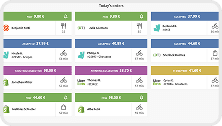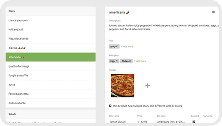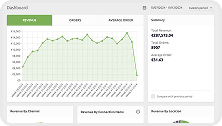Référence API
- home
- Développeurs
- Référence API
- API Extensions
API Extensions
The HubRise API can be extended in two ways:
-
Custom fields let you attach arbitrary data to existing resources. For instance, you could add a
tracking_urlfield to orders. -
Custom endpoints let you create new endpoints in the API and bind them to 3rd party services. For instance, you could bind a cloud printing service to a location, so that calling
POST /location/orders/bd1f2/:printwould actually print thebd1f2order
Extensions let clients implement use cases not natively supported by the API.
The HubRise development team monitors how extensions are used in an effort to document and "standardize" the most common fields and endpoints. You can contact us to discuss about your use case and see if it could fit into existing and well supported extensions.
1. Custom Fields
Custom fields can be defined on the following resources:
CustomerOrderLocationSku
Each resource of the above types has a custom_fields field, which can be populated with arbitrary data.
The field is retrieved in GET operations upon the resources, and is updated with POST, PUT or PATCH operations.
1.1. Example Workflow
POST /location/orders{ "status": "new", "custom_fields": { "tracking_url": "https://order.tracking.com/orders/664578", "delivery_out": "2020-03-19T19:25:00+02:00" }}
This request creates a new order, with 2 custom fields.
Now let's modify the custom fields:
PUT /location/orders/bd1f2{ "custom_fields": { "tracking_url": "https://order.tracking.com/orders/664579", "delivery_out": null, "timeout": "1800" }}
This request:
- updates the value of the
tracking_urlcustom field to ...664579 (instead of 664578) - removes the
delivery_outcustom field - adds a new
timeoutcustom field to the order
Now if you retrieve the same order:
GET /location/orders/bd1f2->{ ..., "custom_fields": { "tracking_url": "https://order.tracking.com/orders/664579", "timeout": "1800" }}
Custom fields work in the same way on orders, customers and locations.
1.2. Data Constraints
A custom field can be of any type. You can even pass JSON objects as values:
PUT /customer_lists/map4g/customers/g56qf{ "custom_fields": { "position": { "latitude": "48.8697246", "longitude": "2.3061506" } }}
In other words, custom_fields just has to be a JSON object.
The only limitation is the size: the JSON representation of custom_fields must not exceed 8 kilobytes.
1.3. Callbacks
Custom fields work nicely with callbacks. Updating the custom fields of a resource triggers the update callback of the resource.
2. Custom Endpoints
Coming soon


